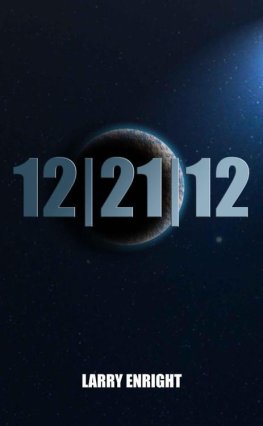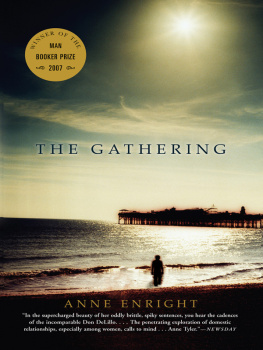Larry Enright - 12|21|12
Here you can read online Larry Enright - 12|21|12 full text of the book (entire story) in english for free. Download pdf and epub, get meaning, cover and reviews about this ebook. year: 2012, publisher: Lawrence P. Enright, genre: Science fiction / Romance novel. Description of the work, (preface) as well as reviews are available. Best literature library LitArk.com created for fans of good reading and offers a wide selection of genres:
Romance novel
Science fiction
Adventure
Detective
Science
History
Home and family
Prose
Art
Politics
Computer
Non-fiction
Religion
Business
Children
Humor
Choose a favorite category and find really read worthwhile books. Enjoy immersion in the world of imagination, feel the emotions of the characters or learn something new for yourself, make an fascinating discovery.
- Book:12
- Author:
- Publisher:Lawrence P. Enright
- Genre:
- Year:2012
- ISBN:978-1-475-03957-3
- Rating:3 / 5
- Favourites:Add to favourites
- Your mark:
- 60
- 1
- 2
- 3
- 4
- 5
12: summary, description and annotation
We offer to read an annotation, description, summary or preface (depends on what the author of the book "12" wrote himself). If you haven't found the necessary information about the book — write in the comments, we will try to find it.
12 — read online for free the complete book (whole text) full work
Below is the text of the book, divided by pages. System saving the place of the last page read, allows you to conveniently read the book "12" online for free, without having to search again every time where you left off. Put a bookmark, and you can go to the page where you finished reading at any time.
Font size:
Interval:
Bookmark:
Larry Enright
12|21|12
For the 6.8 billion
With Special Thanks to Cicely and Dan
Preface
The world ends for someone every day. One day it will end for everyone.
The Smartest Man on the Planet
Dr. Philip Loeb was a theoretical mathematician. He had always said, without pretension of modesty, that he was the smartest man on the planet. At eighteen, he earned his first Ph.D. in mathematics, and three years later, a second in astrophysics. He published his first scholarly work at the age of fifteen and his first best seller, One Galaxy at twenty-one. His rise to fame was meteoric, and with it came myriad honors and memberships in every major scientific society in the world. The university where he was employed provided him with a spacious office, a full professorship, a token course load of one honors class a semester, free lodging, and a salary that was a kings ransom.
But for all his intelligence and all his fame, Dr. Philip Loeb could not make the trains run on time. His was late that day and he had missed his connecting flight to Philadelphia for a scientific conference at which he was to lecture. We Are Not Alone that was the title he had given it to attract more interest but in truth it was a dry dissertation on the technical aspects of faster-than-light space travel. That was his specialty the mathematics of the folding of space and time.
For many years, Loeb and most of the scientific community believed it more likely than not that life existed on other worlds throughout the universe. The 2011 discovery by NASA of planet Kepler-22b had all but closed that discussion. It was the first known planet in the universe other than Earth where liquid water could exist on its surface and where the temperatures were earthlike, and therefore, where human life could exist. NASA had already cataloged a thousand others like it since the Kepler-22b discovery, but, as exciting as this was, it would neither lead to further government funding nor to manned explorations. The reason was simple Kepler-22b, the closest of them, was a staggering six hundred light years away.
But Loebs theories changed all that. Uncovering the secret to folding space and time made the distance between worlds meaningless and time irrelevant. The six hundred light years of space between Earth and Kepler-22b could simply be folded over, and man would be there in an instant. He could even be there yesterday if he so chose, strike a match, return to Earth, and watch it ignite six hundred years from today. That was the paradox of space and time. If he was right, and Loeb always was, faster-than-light travel would recapture the imaginations and purse strings of a public that had lost its taste for riding the carousel of expensive and boring unmanned missions. The brass ring was a virtually limitless universe of raw materials for whoever got to them first, countless worlds for a desperately overpopulated planet to expand into, and who knows how many intelligent civilizations waiting to become the worlds next customers.
The possibilities were endless, but the one that fascinated Loeb, and the one for which he was publicly ridiculed, was that some other civilization already knew the secret, and they had found us before we found them. It was only logical. Life-sustaining planets have existed for billions of years, modern day Earth humans for a mere two hundred thousand. If we were on the verge of discovering the secret of faster-than-light travel, would it not follow that a planet with even a one or two hundred-year head start on us would already know it?
That kind of thinking did not sit well with most people. Somewhere in its brief history the human race had acquired a belief that it alone was chosen to rule the world, and once worlds beyond Earth were discovered, to rule them as well. Loebs intimation that things might be otherwise was heresy and became an embarrassment to the university. That kind of talk put him in the same category as every other crackpot claiming to have seen a UFO or a creature from another planet. He was no better than the nutcase who said he was abducted by aliens and probed and genetically altered before being returned to his family. The university was forced into damage control mode. Loeb was not required to recant outright, but if he wanted to continue in their employ, he needed to equivocate, become more ambiguous on the subject, withdraw from the public eye for a time, and above all stay out of the papers. Loeb did all that, but it did not change his conviction that Earth was being visited on a regular basis by a higher intelligence.
The airline agent was very accommodating. She had read his first book and enjoyed it because it was the first science book she could understand, and she liked the pictures. She got him to autograph his worthless plane ticket for her while she found an alternate flight on a helicopter that would get him to his destination sooner because it would land on the roof of the conference center, not twenty miles away at the airport. Loeb didnt like flying and he particularly didnt like flying in helicopters. They made him sick to his stomach for hours afterwards.
This was what was on his mind that particular afternoon as he neared the conclusion of his lecture.
Given the data obtained from recent discoveries with respect to creating an infinitesimal black hole under laboratory conditions and given the calculated gravitation pull on the space within the event horizon of the created singularity, and if you properly interpret these equations I have developed from that data, it becomes clear that faster-than-light speeds can be achieved by the folding of space and possibly time as well.
At exactly 12:21:12 p.m. the slide with his equations on it rippled like a pebble in a pond. His hands shook, and he felt sick to his stomach. His heart pounded on his eardrums. Loeb closed his eyes, the moment passed, and he refocused on his notes. When he looked up again to ask if anyone had any questions, he found the auditorium empty. A minute ago, the rooms three hundred seats had been filled with coughing, sneezing, throat clearing attendees pretending to understand theoretical mathematics. Now they were all gone, not gotten up and walked out on him gone he would have heard that. And not up in a puff of smoke gone he would have seen that and smelled it. No, they had simply vanished, as had everyone else in the conference center, and everyone else on the street outside, and everyone in every other place he looked. Gone.
He panicked, but panic gave way to questions and hypotheses. For Loeb, the world had always been about solving equations and plugging in numbers. The worlds number was not up, one simple fact told him otherwise not everyone had vanished. He had not. Therefore, it was not the end. Therefore, there had to be others, people with something in common, some factor he had not yet perceived, something that kept them and him from being swept away into the cosmic trash can with the rest of humanity.
He tried to contact his colleagues and friends around the globe. Web servers were up. The Internet was functioning. He had five bars on his phone. Everything was working, but no one was answering. Loeb wandered the city streets. It seemed normal enough: traffic lights told him when to walk and when to wait, tinny holiday music enticed him to come into the department stores for some last-minute shopping, and neon signs seared their impressions into his brain so that he would remember to tell his friends over dinner that night. But a snarl of stalled cars and busses filled every street on every block as if everyone in the city had simply shut off their engines and left.
Near City Hall, Loeb stopped at a newsstand. Under a portable radio spilling static into the frigid afternoon was wedged the last copy of the
Font size:
Interval:
Bookmark:
Similar books «12»
Look at similar books to 12. We have selected literature similar in name and meaning in the hope of providing readers with more options to find new, interesting, not yet read works.
Discussion, reviews of the book 12 and just readers' own opinions. Leave your comments, write what you think about the work, its meaning or the main characters. Specify what exactly you liked and what you didn't like, and why you think so.











